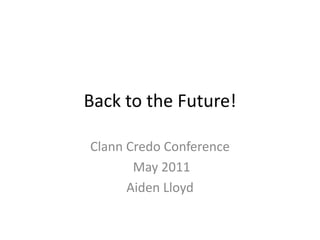
Aiden Lloyd - Director, Society of Cooperative Studies Ireland
- 1. Back to the Future! Clann Credo Conference May 2011 Aiden Lloyd
- 2. The perspective and the problem Asked to add a note of realism at the end of proceedings Deja Vu moment - social economy/social enterprise/3rd sector kept being rediscovered ..... and forgotten about! Problem: Why do we keep doing the same thing using different words but never get anywhere? Social change perspective - but also involved in laying down a local social economy infrastructure in Tallaght in the early 1990s
- 3. A short history... Social economy is a wide mantle and has taken particular forms in different countries & contexts In Ireland rooted in the cooperative movement, especially agricultural, and latterly by the credit union movement Resurgence in the 1990s through the local development programme – PLANET ‘Building the Social Economy’ & Community Business Study by ADM, partnerships provided a local mechanism (funding, support). Advocacy taken up by community sector through Social Partnership Adopted in Partnership 2000 – €52M, option of C&V pillar was to put into FAS on basis of getting it mainstreamed
- 4. .... a short history FAS was (and is) an employment and training agency. Never developed a coherent enterprise wing – although several attempts e.g. cooperative development unit. Subsequently, after some manoeuvring, reassigned to CR&GA in 2005 and implemented through Pobal in 2006 Intent was to run out as a true social economy initiative through partnerships Department became very directive and CSP became community services rather than enterprise focused
- 5. The problem Actually a number of problems - when combined they are cumulative. One is given, but the others are within our own gift. The policy problem – aberrations within the political/administrative system The problem of definition – considerable confusion The problem of intent – separating purpose and targeting The problem of implementation – what is required for successful implementation
- 6. The policy problem – paradox of continuity and discontinuity Continuity of architecture and discontinuity of thought is a policy feature Almost impossible to abandon old infrastructure or reconfigure architecture to suit new contexts. Result of populism – unable to make hard decisions that meet contemporary needs Second factor is the goldfish syndrome - every circuit reveals a new world! Institutional knowledge unappreciated and eventually lost. Accumulated knowledge and skills abandoned.
- 7. Problem of definition – too many terms In my time a plethora of descriptions has been used to describe this area of activity – ‘social economy’, ‘third sector’, ‘social enterprise’, ‘community business’ All very confusing! And there are other confusions, NICVA now define the ‘third sector’ as voluntary organisations plus social enterprises. Similarly in the South many people see all community sector activity as the ‘third sector’ – trade unions in particular. In most of these cases the confusion is between intent/focus of the activity or it separates out particular component parts, for instance its employment capacity
- 8. Problem of definition – sticking to fundamentals (at this formative stage) Importance is in the primary definition. Social economy refers to the section of economic activity that sits between the private and public - generally associated with market failure i.e. where there a demand that cannot be adequately met by the market or the state Social enterprises are the mechanism to meet this wide range of needs Characteristics: trading/contracting, employing people, generating income while focused on social goals or social benefits
- 9. Problem of intent – the confusion between function and focus In policy terms, social economy activity used in different ways in different countries or contexts – locate the unemployed; reintegrate people back into labour market; promote social integration; deliver social services Problem is that advocacy has led with the particular focus rather than the creation of a third economic sector
- 10. Problem of implementation Sector will not develop unless there is a solid institutional framework within which to do so The sector needs to name this and pursue it. Need to know what is required, be clear and simple about it The state has a clear role to play in creating the conditions for social enterprise to develop in a structured and coherent manner Supportive policy framework that provides an appropriate financial, taxation and employment environment A range of funding mechanisms – trusts, community (Credit Union) and private funds and state grant aid A network of local support agencies to provide project development and support, skilling and networking opportunities Report of the Task Force on Social Enterprise provides an argument and a basis for putting this in place – now more than ever we need to get it right this time.